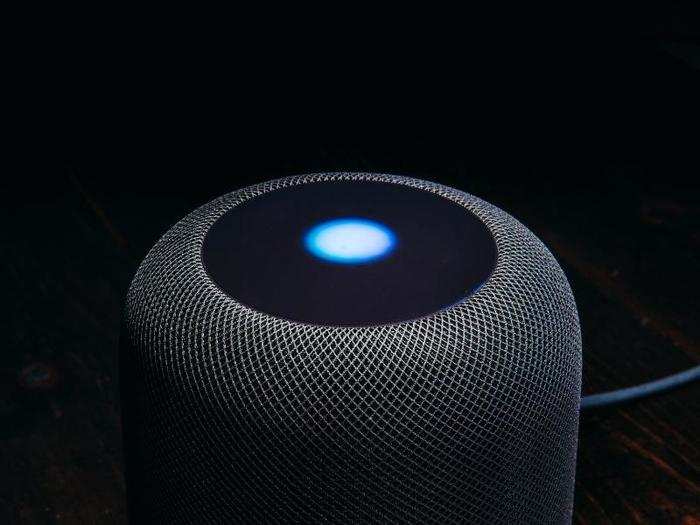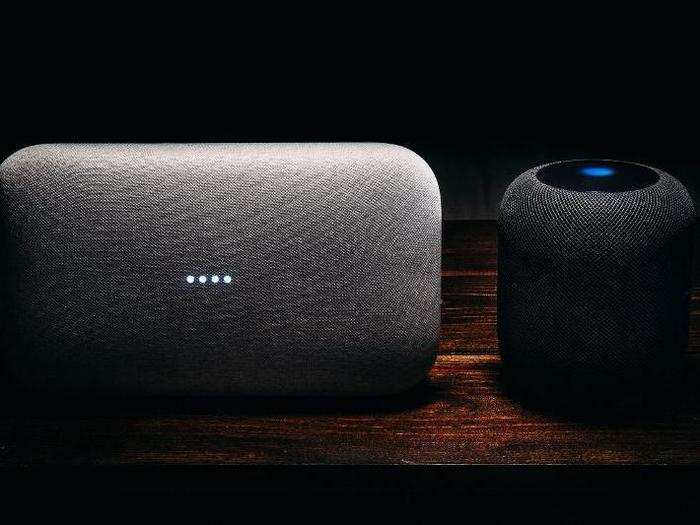- Home
- slideshows
- miscellaneous
- I've been living with the Google Home Max and Apple's HomePod side by side for almost 6 months, and they both have one major problem
I've been living with the Google Home Max and Apple's HomePod side by side for almost 6 months, and they both have one major problem
Before we get to the more serious issues, I want to talk about the surface-level pros and cons. Let's start with the Google Home Max, and all the things I love and hate about it.

Now, for the HomePod. There are plenty of positives and negatives about that device, too.

Let's start with the good.
I'm surprised to say that after several months of living with the HomePod, I love the look and feel of it. Its shape is unassuming, even a little comforting, like a marshmallow. I also appreciate that when you say, "Hey Siri," the top lights up with a swirling rainbow orb. Design-wise, the HomePod is an A+ for me.
Plus, the HomePod is a great device for Apple TV users. I paired my HomePod with my Apple TV, and it totally changed my TV viewing experience. Now, instead of my garbage TV speakers, I listen to all my movies and TV through the HomePod. Not only do I no longer need to crank the volume just to hear anything, watching movies and shows on my TV is simply more enjoyable.
But there are a few downsides.
The HomePod sounds solid. I hesitate to say excellent, but I think that may have something to do with the placement: My HomePod lives on my TV stand near a wall, so the 360-degree sound is sort of lost on me. The Google Home Max almost always sounds better, since the sound is coming at me straight-on. It's not the HomePod's fault, exactly, but I can't imagine everyone who wants a HomePod will have the right setup to thoroughly take advantage of the design.
There's also one more glaring downside: Siri just isn't that smart. If I have a random question, want to play a specific song or album, or basically do anything besides alter the volume, I do not ask Siri to do it. That's fine — I wouldn't have bought the HomePod for its smarts, anyway — but it's a bit frustrating that in 2019, Apple's smart assistant still hasn't improved much.
Now for the real issue: Both the Google Home Max and the HomePod are starting to really freak me out.

I have been a proponent of smart speakers for a while now. I've never been overly concerned about them listening to me, or spying on me, or recording my conversations and sending them to people in my contacts. Those fears are valid, but they're not my fears.
Lately, though, I've been growing more concerned.
Both the HomePod and the Google Home Max have been randomly speaking — or lighting up and listening in without being prompted — several times a week. Both devices will listen in when anything is said that remotely resembles their wake words, or they'll just jump in on conversations, uninvited.
A prime example: A few weeks ago, my boyfriend and I were sitting on the couch watching a new episode of "True Detective." In one scene, the main characters are poking around the yard of a murder suspect while he isn't home. It was a tense — and more importantly, quiet — scene, if not a particularly scary one.
All of a sudden, without warning, Siri quietly said, "Hi."
It took my boyfriend and I a full beat to realize it didn't come from the show itself. Siri had just made her presence known for no reason at all.
This isn't unusual. Siri will speak, unprompted, all the time. One time, she literally spoke in tongues while my sister and I were chatting across the room. Other times, Siri will suddenly say things like, "I'm listening," which I know is standard when Siri is activated and then you don't say anything, but is not exactly reassuring to hear, especially when I didn't prompt her in the first place.
If you think Google Assistant is any better, though, you'd be wrong. The Google Home Max listens in all the time. It doesn't wait for a pesky wake word — in fact, it appears to have totally emancipated itself, and it now listens in whenever it feels like it, at strange and sometimes inopportune moments.
For example, in that same episode of "True Detective" a few weeks back, Mahershala Ali's character says something truly heinous that I cannot repeat here (if you've seen season 3, episode 2, you may know what I'm talking about). For some reason, Google Assistant chose that particular moment to tune in. I can promise you, what he said definitely didn't resemble "Hey Google."
After that, we've become deeply concerned about what sort of information Google has tied to my account, and I'm a little worried about what my search results may start looking like.
This happens all the time. About 50% of the time someone says "Hey" or "OK" in my apartment, the Google Home Max starts listening. While it's supposed to wait for the full phrase — "Hey Google" or "OK Google" — it often ignores that mandate in favor of listening in on what we're saying. The device doesn't talk out of turn as often as the HomePod does, but the Google Home Max has a major eavesdropping problem.
The verdict: Both devices are excellent, but if you're at all concerned about personal privacy, they still have a ways to go.

My issues with the Google Home Max and the HomePod aren't enough to make me unplug them and shut them away in a dark closet. As naive as it may sound, I don't feel as though they're doing something intentionally nefarious, and I also don't think they're actually capturing as much as I think they are. (Seriously, I checked. Inside my Google Home app, it's not showing any surprising saved data beyond my typical queries, like "What's the weather like outside?")
Sure, it would be great if Siri spoke out of turn less often, because it generally creeps me out and sometimes truly terrifies me, especially when I'm home alone. And I'd love if the Google Assistant would wait for its wake word instead of firing up any time it wants.
But at the end of the day, a few weird kinks won't make me discount how much easier both devices have made my life, how nice they look in my home, and how great they sound when they play music, movies, and TV.
And after nearly six months, I wouldn't say one is better than the other. If you use Spotify and a lot of Google apps, want a very smart smart assistant, and if you're looking for a speaker to sit on a shelf, buy the Google Home Max. If you own a lot of Apple products (especially an Apple TV), use Apple Music, don't really care about a smart assistant, and you want a speaker for a central location in your home, go with the HomePod.
Just be prepared for a few bugs either way.
Popular Right Now
Popular Keywords
Advertisement